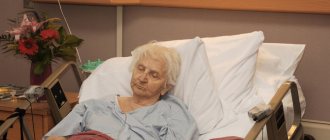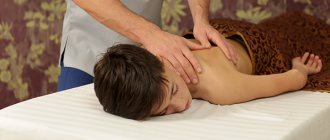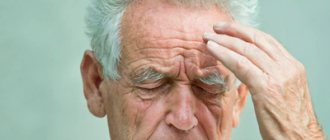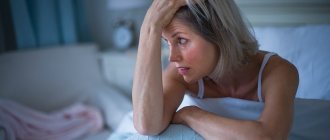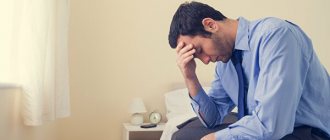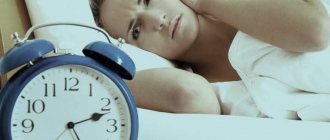- home
- Helpful information
- Elderly care
- Sleep disorders in older people
35% of older people have problems sleeping. The older you are, the more often such disorders occur. These may include difficulty falling asleep, waking up early, or interrupted or shallow sleep. A person may be disturbed by vivid, unpleasant dreams, he may experience fear of the night or dreams, and may not feel rested in the morning. Problems gradually accumulate: anxiety and tension increase, which makes it more difficult to fall asleep, and the period of night rest lasts less. To normalize the regime, you need to determine the reasons why it was violated.
Sign up for a consultation
Why do sleep problems occur?
There are two categories of violations.
Primary. Most often this is sleep apnea, which is manifested by short breath holds. Because of them, a person wakes up and then cannot fall asleep. The older you are, the more often such disorders occur. Their risk is higher in overweight people who are prone to snoring for a long time. In other cases, myoclonus (convulsions, muscle twitching), restless leg syndrome (trembling) interferes with sleep.
Secondary. They arise due to neurological, mental disorders, and some somatic diseases. These could be heart problems (frequent attacks of angina at night), bronchial asthma or COPD, pain syndromes, endocrine pathologies. If sleep disorders are associated with physical well-being, the person sleeps superficially, often wakes up, but can then fall asleep. With neurological problems, difficulties may arise both in falling asleep and in maintaining sleep. In two thirds of cases, secondary disorders are associated with mental disorders: depression, neuroses, dementia, high levels of anxiety, etc.
More often than not, sleep problems have several causes. For older patients, this may include an iatrogenic factor—taking medications that cause insomnia. Among these drugs are antidepressants, nootropics, antiarrhythmics, antihypertensives, bronchodilators, etc. Insomnia can be caused by their overdose or side effects.
The task of a gerontologist, psychiatrist or therapist when working with an elderly person is to collect as much information as possible about how insomnia manifests itself and what features it has in a particular case.
It is important to determine its root cause. In diagnosis, it matters what time a person falls asleep, whether he wakes up at night, how long he sleeps continuously, what his dreams are like, and how he himself assesses sleep productivity. The nature of the disorders and their possible causes allow us to select the most effective method of therapy. You have questions?
We will call you back within 30 seconds
or call the number
Clicking the "Submit"
, you automatically consent to the processing of your personal data and accept the terms of the User Agreement.
Sleeping pills with addictive effect
These are powerful drugs that have an immediate effect on the body. They can be taken only in case of urgent need, since regular use entails in this case addiction and drug dependence.
Such drugs include:
- antihistamine drops;
- benzodiazepines;
- barbiturates.
They improve the process of falling asleep and the quality of sleep, but put a person into a state of drug intoxication with a sharp decrease in activity, weakness, tearfulness and apathy. In case of overdose, problems with the respiratory system, intoxication of the body, blurred vision, and even death may occur.
Non-drug treatment of insomnia in older people
At the first stage, they try to correct sleep disorders without using sleeping pills. To do this, older people are advised to:
- go to bed and get up in the morning at the same time, adhere to a strict regime. Going to bed should begin only after drowsiness appears;
- If you can’t fall asleep within 15-20 minutes, you can’t stay in bed: it’s better to get up, move to a chair or another room until you want to sleep again. If possible, the bed should be associated with sleep, and not with insomnia;
- You shouldn't sleep during the day. If severe drowsiness occurs, the recommended rest time is no more than 30 minutes;
- in the evening it is better to refrain from rich, high-calorie food, too strong impressions, and drinking tonic drinks;
- Sleep hygiene is important. The bed linen should be fresh, the mattress and pillow should be comfortable. It's better if the bedroom is cool. Curtains - thick, not letting in light;
- spend the evening hours quietly, doing the same activities. You can use daily “rituals” to relax: take a shower, read before falling asleep, drink a glass of milk, etc.;
- increase physical activity in the morning. Muscle fatigue improves the quality of rest at night. After lunch or in the late afternoon, you can go for a long walk;
- after lunch, exclude drinks and foods containing caffeine or other tonics (tea, coffee, chocolate, sweets, cocoa, etc.);
- stop drinking alcohol. Alcohol does not replace sleeping pills: “drunken” sleep is superficial and does not provide complete rest.
Relaxing baths
An evening bath is also an effective remedy for overcoming insomnia. However, many make a mistake that negates its positive effect - they make the water hot, although it should not exceed +36°. The optimal completion of the procedure will be a contrast shower, which improves the tone of the body. The following is added to such baths:
- pine decoction: add a glass of pine needles to 3 liters of water; a few spruce or pine cones are not forbidden. Boil for 10–15 minutes, let steep for at least 2 hours. The duration of the procedure is 20–30 minutes;
- Linden blossom is also a suitable choice. 2 cups of inflorescences, poured 2 liters of boiling water, leave for 3 hours. A relaxing bath can last up to half an hour;
- Boil 100 g of valerian root for 15 minutes in 1 liter of water. Or you can simply add 20 to 35 drops of ready-made valerian tincture to the bath.
Folk remedies act gently and gently on the body, so the effect usually does not appear instantly. But relief will definitely come and last for a long time. Getting rid of insomnia is quite possible.
Insomnia medications for older people
Medicines are used only if compliance with general recommendations, correction of diet and nutrition do not produce results. Sleeping pills are used with extreme caution:
- only with diagnosed insomnia (sleep disturbances recur for a long time and negatively affect the patient’s physical and mental state);
- the minimum effective dosage is prescribed;
- therapy is intermittent. Taking the drug is allowed 2-3 times a week (not daily). Courses of treatment are short, do not exceed 3-4 weeks;
- monitoring the condition while taking the drug, gradually reducing the dosage immediately after receiving the result.
If sleep disturbances are secondary, caused by some underlying disease, therapy is aimed primarily at treating it. For primary disorders, medications are prescribed taking into account exactly what problem is causing insomnia. For muscle spasms, tranquilizers can be effective; for apnea, cyclopyrrolones are more often used.
When prescribing any psychoactive, sedative and other drugs to elderly patients, the dosage is reduced as much as possible, taking into account age and health status. You cannot independently increase the dosage or duration of the course - this is dangerous for the development of drug dependence and a negative impact on cognitive functions. With long-term continuous use of certain sleeping pills, concentration, attention, and thinking may decrease.
Lungs
Elderly people are recommended to start therapy with drugs that have a mild sedative and hypnotic effect.
Afobazole
Afobazole belongs to the group of anxiolytics. It has a neuroprotective effect, reduces the severity of anxiety and irritability.
Pros:
- does not impair cognitive functions;
- quickly eliminated from the body;
- eliminates neurotic conditions.
Minuses:
- causes allergies;
- dyspeptic disorders (nausea, diarrhea);
- headache;
- The therapeutic effect develops after a few weeks.
Contraindications:
- galactose intolerance;
- treatment with Carbamazepine and Diazepam.
Price: from 390 rub.
Negative reviews are associated with high cost and lengthy treatment. It is not effective for severe sleep disorders.
Analogues: Tenoten, Phenibut, Adaptol.
Prices for Afobazole tablets 10 mg 60 pcs.;
Glycine
The active substance is an amino acid with an inhibitory effect on the central nervous system. Improves metabolism in brain tissue, reduces psycho-emotional stress.
Pros:
- improves cognitive functions;
- helps to sleep;
- reduces the toxic effects of alcohol;
- helps with encephalopathy and ischemic stroke;
- reduces the severity of side effects of neuroleptics and antidepressants.
Minuses:
- may lower blood pressure;
- light sleeping pills.
Contraindication for use is individual intolerance.
Price: from 40 rub.
Doctors speak positively about the medicine, but with the caveat that Glycine should be taken only in combination with other sedatives. May not be effective as a sleep aid for older people.
Analogues: Glycised, Phenibut, Tenoten.
Prices for Glycine sublingual tablets 100 mg 50 pcs.
Sleep disorders and dementia
In senile dementia and other delirious disorders, severe insomnia develops. Elderly people themselves do not complain about it, but for nearby relatives such sleep disturbances become a serious problem. A person does not fall asleep himself, does not allow others to sleep, his sleep and wakefulness patterns change. Therapy in this case requires a special approach.
In dementia, problems with sleep manifest themselves as a violation of the daily routine: during the day a person experiences drowsiness, and closer to night anxiety and agitation increase. The patient may try to leave home, collect things, tie knots, experience hallucinations, etc. It is dangerous to use tranquilizers in this condition: they can worsen health and make the patient even more restless.
It is possible to use antipsychotics and correct previously prescribed drug therapy. Medical doctors recommend changing your regimen so that the bulk of your activity occurs during the daytime hours. This will help restore the circadian rhythm, control it, and reduce the frequency of insomnia episodes.
Order a visit from a gerontologist. Experienced doctors. Treatment in a hospital or at home. 24-hour service in Moscow and the region. Professional, anonymous, safe.
- Caring for the elderly with mental disorders
- Psychiatrist help at home
- Types of rehabilitation for the elderly and disabled
- Advantages of our hospital
- How to choose a good nursing home
- Care for the elderly: in a hospital or at home
- Problems of caring for the elderly
- Who should you leave a person with dementia with if you need to leave?
- Help from a gerontologist in caring for an elderly person
- Sleep disorders in older people
- Features of caring for a bedridden patient
- Features of caring for older people with mental disorders
- Hygiene in old age
- Establishing guardianship for a patient with dementia
- Rules for communicating with an elderly person
- 10 Frequently Asked Questions About Nursing Homes: Everything You Need to Know
After a stroke
After a stroke, one of the consequences is sleep disturbance. Insomnia can be triggered by mental pathologies due to cerebral circulatory disorders, apnea, and movement disorders. Insomnia medications should only be given to patients after a stroke after a doctor has written a prescription.
Donormil
The drug helps eliminate depression, which is a common accompaniment of post-stroke conditions. However, when prescribing, a number of side effects and contraindications of Donormil are taken into account. Doctors do not recommend treating insomnia with this drug, as patients may experience decreased cognitive function.
Prices for Donormil tablets 30 pcs.;
Zolpidem (Ivadal, Sanval, Ambien)
Refers to hypnotics, anxiolytics and sedatives. The action is similar to benzodiazepines. Scientists from the Stanford School of Medicine have found that in low doses the drug allows for faster recovery from a stroke by enhancing the activity of nerve cells.
Pros:
- has an anticonvulsant effect;
- an effective remedy even when prescribed minimal doses;
- normalizes sleep stages;
- does not cause drowsiness during the day;
- quickly begins to act.
Minuses:
- the appearance of headache, dizziness, double vision;
- development of paradoxical insomnia;
- anterograde amensia may develop;
- the occurrence of dyspeptic disorders and abdominal pain;
- development of behavioral disorders;
- development of addiction.
Contraindications:
- severe respiratory failure;
- sleep apnea;
- myasthenia gravis;
- allergy to benzodiazepines;
- severe pathologies of the liver and kidneys;
- lactose intolerance;
- simultaneous use of barbiturates, antiepileptic drugs, narcotic analgesics, Buprenofrine, Baclofen.
Price: from 900 rub.
Reviews from doctors about the medicine are positive as effective tablets for insomnia for the elderly. Not recommended for long-term therapy.
Analogs: Hypnogen, Zolsana, Snovitel.

